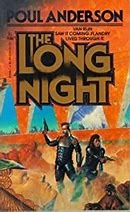"'...men of Sol.'"
-Poul Anderson, "The Star Plunderer" IN Anderson, Rise of the Terran Empire (Riverdale, NY. March 2011), pp. 325-362.
- and, in the companion story, we read:
"The men of Sol were weltering in a fight..."
-"Sargasso of Lost Starships," VI, p. 418.
Will that be enough to unite us in a future age - that we come not from the same country, continent or even planet but the same star? In "Sargasso...," we read:
"The men of the Imperial Solar Navy walked close together." (V, p. 408)
- but also:
"...the Terrans rushed ahead." (p. 418)
- and:
"There was a break in the combat around the hard-pressed Terran ring as the Arzunians drew back to pant and glare." (VI, p. 422)
Thus, the word used alternates between "Sol," echoing Argos, and "Terra," anticipating Flandry and the title of this collection, Rise of the Terran Empire. Argos might have led us in a different future historical direction but the Solar Empire that he founded was incorporated into the Technic History where it was identified with the Terran Empire later defended by Dominic Flandry.
We are surprised to learn how much history Donovan has with the Arzunians, knowing several of them by name and remembering their past shared revelries.

8 comments:
Kaor, Paul!
We could rationalize this possible inconsistency by assuming there was some hesitation in the early Empire on whether to favor either the "Solar Empire" or the "Terran Empire." And that use of "Terran" could mean the latter formulation was becoming preferred.
Anderson came to decide that peoples, humans or not, would identify with the planets they came from or served. With some names like Terra/Terran taking on larger or wider meanings.
Ad astra! Sean
500 years ago, English-speaking and England were pretty much the same thing, with minor exceptions in Scotland and Ireland. Not any more! Most English-speakers don't live in the British Isles any more.
So as context changes, the labels and their meanings do too.
Kaor, Mr. Stirling!
Which is what we see happening with Anglic, descended from our Old Modern English, in Technic civilization, becoming a classical language after the Empire fell.
Ad astra! Sean
Sean: I suspect that widespread, easily accessible sound recording will slow down, though not stop, linguistic change.
Eg., listen to a Bogart movie from the 1930's. There have been changes in slang, and regional accents have diminished, but there have been few major shifts in sounds and syntax.
Much less than those between 1833 and 1933.
By way of contrast, listen to the very first sound recordings, and there are marked differences. Nobody talks like Teddy Roosevelt now.
Kaor, Mr. Stirling!
Absent drastic social and political changes analogous to what happened after the fall of the Roman Empire I can see standard English changing only slowly.
I recall one of your BLACK CHAMBER books describing how TR spoke with an upper class Groton School accent. That has pretty much faded away?
Ad astra! Sean
Sean: yup. FDR had a version of the same accent. This is the link to a recording of TR:
https://www.c-span.org/video/?96805-43/theodore-roosevelt-audio-recording
That's TR addressing the Progressive Party convention of 1912.
It's sort of a quasti-RP British accent, leavened with American. Not that the accent is somewhat inconsistent in its treatment of 'r' sounds.
There are a couple of video collections of the voices of the US presidents going back to Benjamin Harrison, who sounds very different - presumably because of his education - than most of those who follow; who are all fairly similar "educated WASP" accents until the 1920s; Coolidge sounds very different. Hoover has a more modern cadence, but still sounds old-fashioned.
FDR sound much more modern, but still with an overlay of the 19th Century; Truman has a flat Midwest accent, but even then, not what would sound "standard" to us today; same for Eisenhower, etc.
Someone of that era whose voice sounds very different than one would expect is George Patton, who was born and raised in California but has a different cadence than his peers like Marshall and Eisenhower. King's Ohio accent comes through very clearly (he sounds more modern than many of his peers) and Nimitz has just a tinge of Texas ...
Kaor, Mr. Stirling and Dave!
Both: Many thanks for these comments. It reminded me of how, when I was buying some tourist trappy stuff in London, the shopkeeper asked me if I was from Massachusetts! Not just New England in general, the state itself. That has stuck with me, how a Briton could tell where I came from so particularly just by my accent.
Ad astra! Sean
Post a Comment